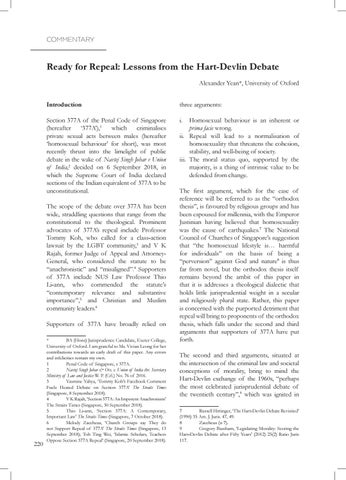COMMENTARY
Ready for Repeal: Lessons from the Hart-Devlin Debate Alexander Yean*, University of Oxford Introduction
three arguments:
Section 377A of the Penal Code of Singapore (hereafter ‘377A’),1 which criminalises private sexual acts between males (hereafter ‘homosexual behaviour’ for short), was most recently thrust into the limelight of public debate in the wake of Navtej Singh Johar v Union of India,2 decided on 6 September 2018, in which the Supreme Court of India declared sections of the Indian equivalent of 377A to be unconstitutional.
i. Homosexual behaviour is an inherent or prima facie wrong. ii. Repeal will lead to a normalisation of homosexuality that threatens the cohesion, stability, and well-being of society. iii. The moral status quo, supported by the majority, is a thing of intrinsic value to be defended from change.
The scope of the debate over 377A has been wide, straddling questions that range from the constitutional to the theological. Prominent advocates of 377A’s repeal include Professor Tommy Koh, who called for a class-action lawsuit by the LGBT community,3 and V K Rajah, former Judge of Appeal and AttorneyGeneral, who considered the statute to be “anachronistic” and “misaligned”.4 Supporters of 377A include NUS Law Professor Thio Li-ann, who commended the statute’s “contemporary relevance and substantive importance”,5 and Christian and Muslim community leaders.6 Supporters of 377A have broadly relied on
220
* BA (Hons) Jurisprudence Candidate, Exeter College, University of Oxford. I am grateful to Ms. Vivian Leong for her contributions towards an early draft of this paper. Any errors and infelicities remain my own. 1 Penal Code of Singapore, s 377A. 2 Navtej Singh Johar & Ors. v. Union of India thr. Secretary Ministry of Law and Justice W. P. (Crl.) No. 76 of 2016. 3 Yasmine Yahya, ‘Tommy Koh’s Facebook Comment Fuels Heated Debate on Section 377A’ The Straits Times (Singapore, 8 September 2018). 4 V K Rajah, ‘Section 377A: An Impotent Anachronism’ The Straits Times (Singapore, 30 September 2018). 5 Thio Li-ann, ‘Section 377A: A Contemporary, Important Law’ The Straits Times (Singapore, 7 October 2018). 6 Melody Zaccheus, ‘Church Groups say They do not Support Repeal of 377A’ The Straits Times (Singapore, 13 September 2018); Toh Ting Wei, ‘Islamic Scholars, Teachers Oppose Section 377A Repeal’ (Singapore, 20 September 2018).
The first argument, which for the ease of reference will be referred to as the “orthodox thesis”, is favoured by religious groups and has been espoused for millennia, with the Emperor Justinian having believed that homosexuality was the cause of earthquakes.7 The National Council of Churches of Singapore’s suggestion that “the homosexual lifestyle is… harmful for individuals” on the basis of being a “perversion” against God and nature8 is thus far from novel, but the orthodox thesis itself remains beyond the ambit of this paper in that it is addresses a theological dialectic that holds little jurisprudential weight in a secular and religiously plural state. Rather, this paper is concerned with the purported detriment that repeal will bring to proponents of the orthodox thesis, which falls under the second and third arguments that supporters of 377A have put forth. The second and third arguments, situated at the intersection of the criminal law and societal conceptions of morality, bring to mind the Hart-Devlin exchange of the 1960s, “perhaps the most celebrated jurisprudential debate of the twentieth century”,9 which was ignited in 7 Russell Hittinger, ‘The Hart-Devlin Debate Revisited’ (1990) 35 Am. J. Juris. 47, 49. 8 Zaccheus (n 7). 9 Gregory Bassham, ‘Legislating Morality: Scoring the Hart-Devlin Debate after Fifty Years’ (2012) 25(2) Ratio Juris 117.
